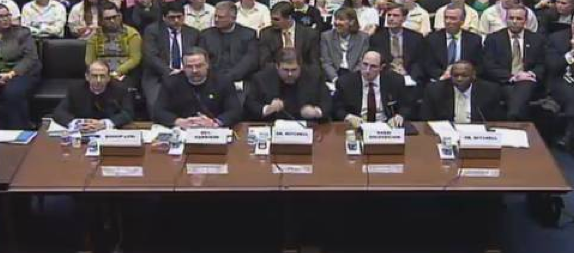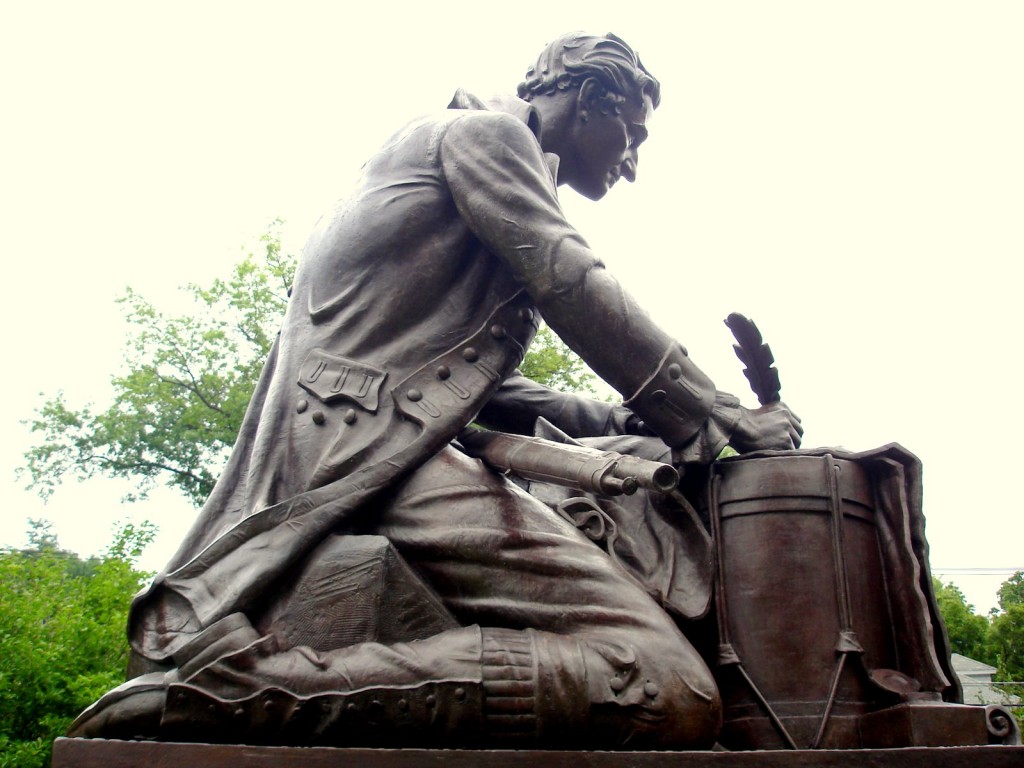This should be the first of a series of posts on these issues, which I hope will provide some critical context for the aggressive radicalism of the Harper government. In the meantime, above is Public Safety Minister, Vic Toews (whose tale will be told in further detail shortly) lying about what he said in parliament last week to opposition members taking a principled stand against Bill C-30, which is intended to provide police unwarranted access to the internet traffic of private citizens.
Category Archives: Ideology
Picture of the Day

I’m pulling together material on Frye and ideology for further posts. In the meantime, picking up on the theme of the brain death of American conservatism, here’s a photo from today’s Republican-sponsered hearing in the House of Representatives on contraception. They did not allow a single woman to testify. They did not allow a single woman to testify on the issue of a woman’s right of access to contraception.
“Or Else”
Bad Lip Reading does Rick Santorum
Over the long hiatus I gave some thought as to how the blog portion of the site might be improved. The encounter with current events from a Frygian perspective is rewarding enough, but perhaps occasionally too fleeting. My strategy has increasingly been to bring current events to Frye rather than the other way round. That’s why I’m attempting to run a lot of threads simultaneously to provide some sturdy terms of reference. I hope to get better at that, and perhaps keep the focus a little tighter than I have sometimes managed.
The American election cycle, for example, has become a grotesquerie more fit for a dystopian satire, thanks to the Republican primaries which have featured a parade of cranks and nincompoops, and appear to be approaching the pitch of mass hysteria with Rick Santorum, of all people, as the current front-runner. Mitt Romney, a sociopathic liar and reptilian opportunist from whatever angle you approach him, remains everybody’s fifth choice, and it may be enough to get him the nomination once the kamikaze portion of the process has finally consumed itself.
The Republicans appear to be the vanguard of the collapse of “conservative” ideology, which has more or less devolved into a kind of casino capitalism where the house always wins and the public are rubes to be stripped of their assets by whatever tricks are available to convince them the game isn’t rigged. As Frye observes, when an ideology becomes decadent enough, it ceases to have any reliable external reference, or even to possess internal consistency. At that point, it may become murderously dangerous. Incidents of political violence in the U.S. have come from the far right for the last couple of decades at least, and has more recently been preceded by escalating rhetorical violence by supposedly authoritative and respectable public figures. If you call political opponents “traitors” long enough, someone’s going to figure out that traitors should only get what they deserve, and that will eventually be served up by some maladjusted simpleton who’s been convinced by Rush Limbaugh and Fox News that the Kenyan-born-Muslim-Nazi-socialist Barack Obama is coming to take away his guns.
The madness isn’t new. It’s just developed a more insidious pathology. Here’s a an excerpt from “Fear and Loathing in New Hampshire,” one of many dispatches from the 1972 presidential campaign trail by Hunter S. Thompson, then chief political correspondent (that is, only political correspondent) for Rolling Stone, published forty years ago, almost to the day:
Meanwhile, I am hunkered down in Washington — waiting for the next plane to anywhere and wondering what in the name of sweet Jesus ever brought me here in the first place. This is not what us journalists call a “happy beat.”
At first I thought it was me, that I was missing all the action because I wasn’t plugged in. But then I began reading the press wizards who are plugged in, and it didn’t take long to figure out that most of them were just filling space because the contracts said they had to write a certain amount of words every week.
At that point I tried talking to some of the people that even the wizards said were “right on top of things.” But they all seemed very depressed; not only about the ’72 election, but about the whole, long-range of politics and democracy in America.
The absurd consequence of this demoralizing trend is this convocation of idiots, most of whom at some attention-deficited moment or other have enjoyed front-runner status: Michelle Bachmann, Donald Trump, Rick Perry, Herman Cain, Newt Gingrich, and Rick Santorum. Mitt Romney, meanwhile, in a rarefied example of Republican cognitive dissonance, remains the presumptive nominee, even though he is intensely disliked for good reason by just about everybody, including most Republicans. These people represent an ideology of greed and predation that was always dubiously articulated at the best of times, and is now so hollowed out that it cannot even pretend anymore to have any relation at all to the public good. It is merely rationalized thievery crafted by bandits.
It is a misconception to say that Frye is anti-ideological, a misconception Jonathan Hart dispels in Northrop Frye: The Theoretical Imagination. But Frye does certainly recognize that ideology is subordinate to the primary concerns whose primary expression is the mythological basis of literature, and therefore the foundation of a genuine social vision liberated from the fatal cycles of panic and complaisance most of human history seems to amount to. As he warns in Words with Power, “primary concerns must become primary, or else.” When our political class is made up of rapacious dolts who promote unregulated markets and deny global warming in the face of all evidence to the contrary in both instances, we have a particularly urgent priority to set it straight, to ensure that political power is an expression of the best interests of society at large and not the caprices of those who don’t know up from down but can blindly nose their way up to the feeding trough replenished by corporate malfeasance. History tends to be cruel at moments like these, and nature is always unforgiving. The institutionalized corruption that almost exclusively characterizes both our politics and principles of governance must be addressed, or else. There are no excuses not to, because, with so much at stake and our situation already precarious, we are all Romanovs now.
The Tank Man of Tiananmen Square
httpv://www.youtube.com/watch?v=qq8zFLIftGk
The “Tank Man,” otherwise known as as “Unknown Rebel,” single-handedly on this date in 1989 brought to a halt a line of tanks the day after the deadly forcible removal of student protesters from Beijing’s Tiananmen Square. Given that these soldiers had likely assisted in the mass murder of as many as thousands of young peaceful protesters, the stubborn bravery of this still unidentified man is inspiring.
The Chinese do not allow access to this clip on Google. Virtually no one under the age of thirty even knows about it.
Frye in Notebook 50:
June 1989. The massacre of the students in Tiananmen Square and the utter complacency of the senility squad about it, their confidence that all they have to do is to keep repeating the big lie, has definitely established Marxism, from Lenin on, as what Blake calls the Synagogue of Satan. Nobody can support a Marxist political movement anywhere now without being, on the Burke principle, not just a mistaken man but a bad man. (CW 5, 406)
Primary Concerns, Democracy, and Conservative Ideology
httpv://www.youtube.com/watch?v=jvE9EN4YPGM
The Hour: Stephen Harper and U.S. style media control
Bob Denham`s article on Frye and Kierkegaard, recently published in our journal, shows the importance in Frye’s later work of the Danish philosopher’s emphasis, among other things, on concern. Frye first develops the idea in terms of the tension or dialectic between freedom and the myth of concern, as most fully worked out in The Critical Path. There it is argued that the imagery of literature is ultimately the language of concern. This insight becomes the basis of his later formulation of primary concerns in Words with Power, where he makes the distinction between primary human concerns and secondary or ideological ones. One of the books of Frye`s now famous Ogdoad (famous at least among amateurs of Frye) is entitled Liberal, and it strikes me that this indicates another source of Frye`s concept of concern, and in particular his formulation of the distinction between primary and secondary concerns.
It would be of great interest to examine this idea of primary concerns as a genuine contribution to socio-political thought, specifically liberal and social democratic thought. Certainly there have been essays touching on the liberal humanism of Frye`s critical position, or what I would prefer to call his critical “vision.” It is often a stance he has been attacked for. More sympathetically, Graham Good, for example, has a particularly discerning article on the subject. Years ago I presented at a conference a very preliminary stab at such an examination, but I have not had the opportunity yet to follow it up. Involved in such a study would have to be a comparison, ultimately, of Frye`s concept of primary concerns with such theories as John Rawl’s idea of basic goods, and even more with Amartya Sen and Martha Nussbaum’s idea of basic human capabilities. These ideas are a different way of talking about human rights and are very close to Frye`s primary concerns, focusing as they do on those universal human needs and wishes that can be regarded as essential to the dignity and fulfillment of every human individual. It is worth emphasizing that it is this kind of thinking in the liberal and social democratic tradition that has given us, among other things: universal health care (now severely threatened); legal access to abortion; gay marriage; serious efforts to ensure gender equality and protect minority rights; a less punitive system of law and order aimed at restoring the incarcerated to reentering and contributing to society; a more welcoming policy to refugees fleeing persecution or unimaginable hardship in their own countries. The list could go on.
These great benefits have derived from an often invisible or inarticulate social norm, not in the normative sense, but as an ideal the departure from which makes irony and the grotesque ironic and grotesque. This ideal is “the vision of a more sensible society,” of a world that actually makes human sense. Such a vision works outside literature among individuals in their daily lives and workplaces, giving meaning to their work and actions beyond any need for a pay-cheque. As Frye writes: “one can hardly imagine, say, doctors or social workers unmotivated by some vision of a healthier or freer society than the one they see around them.” The same could be said of any member of society who contributes in a meaningful way, who has, in other words, a social function, this being, as Frye views it, the real significance of the democratic ideal of equality. In a true democracy, everyone is potentially a member of an elite, and no-one`s social function is more worthy of respect than another’s.
This idea of a social vision, ultimately the vision of a world of fulfilled primary concerns, is particularly useful in defining the issues we face in the current Canadian election campaigns. Any genuine social vision of a healthier or freer society is precisely what the program of Stephen Harper and the Conservatives are devoid of. It is telling that Harper almost always speaks of the economy, never of society. It is as if it doesn’t even occur to him. Contrary, however, to the famous tag-line, it’s not the economy, stupid: it’s society.
Apartheid
httpv://www.youtube.com/watch?v=5s8xkjG8bx4
BBC report on the release of Nelson Mandela from prison in February 1990
South Africans voted in a national referendum to end apartheid on this date in 1992.
Frye in one of the late notebooks links apartheid to the pernicious synthesis of religion and political doctrine:
The worst governments are those with double ideologies, where a political doctrine is backed by a religious one, as in Iran. Israel is better, but I’d hate to have to live even there. But South Africa’s apartheid is buttressed by a remarkably dismal Dutch Reformed creed, and fifty years ago the word “Christian” in the name of a political party meant “Roman Catholic Fascist.” (CW 6, 91)
St. Patrick’s Day
httpv://www.youtube.com/watch?v=TaHMG_SvUkw
The Pogues, “Streams of Whiskey”
On the soberer side of St. Patrick’s Day (that is, any time before about 4 pm), Frye in The Great Code cites St. Patrick’s illustration of the Trinity to make a point about metaphor and doctrine:
The sense in Christianity as a faith beyond reason, which must continue to affirm even after reason gives up, is closely connected with the linguistic fact that many of the central doctrines of Christianity can be grammatically expressed only in the form metaphor. Thus, Christ is God and man; in the Trinity three persons are one; in the Real Presence the body and blood are bread and wine. When these doctrines are rationalized as conceptions of a spiritual substance and the like, the metaphor is translated in metonymic language and “explained.” But there is a strong smell of intellectual mortality about such explanations, and sooner or later they fade away and the original metaphor reappears, as intransigent as ever. At that point we are back to the world where St. Patrick illustrates the doctrine of the Trinity with a shamrock, a use of concrete paradox that enlightens the mind by paralyzing the discursive reason, like the koan of Zen Buddhism. The doctrines may be “more” than metaphors; the point is that they can be stated only in a metaphorical this-is-that form. (CW 19, 73)
Slainte.
Ideology and Psychosis
Giordano Bruno
Giordano Bruno was burned at the stake as a heretic on this date in 1600 (born 1548).
From Words with Power:
We have glanced at the way in which ideological language supports the anxieties of social authority, and of how other types of verbal authority nonetheless establish themselves, for example in science. In the collisions of Galileo and Bruno with the religious functionaries of their time, we recognize that a scientist has a commitment to his science as well as to his society, and that in certain crises he has an obligation to remain loyal to his science, even if silenced or martyred. This may be a simple moral issue of holding on to facts and evidence in the face of reactionary illusion, but it may be something subtler than that. In Galileo’s day the evidence for a heliocentric solar system was not yet conclusive: the geocentric theory seemed still reasonable, and Galileo was really making what is called a leap of faith. This term is used in religious writing, but not every leap of faith is a religious one. As for Bruno, his leaps are so vast and various that even specialists on him find him hard to keep up with. But then Isaac Newton presents an almost equally disconcerting picture when the whole of his output and range of interests is considered.
The authority of science, in other words, expands into a wider and compelling authority of social and intellectual freedom. This will always be relevant as long as the scientist remains a human being whose work has a personal context as well as a scientific one, involved with the ideology even when he challenges certain accepted forms of it. In our day, highly technological society may conscript some scientists into working for its interests, whereupon others will realize that the basis of their commitment to science is a conviction that science exists for the benefit of humanity, not for the promotion of tyranny and terror. (CW 26, 47-8)
Tom Paine
Statue of Paine in Burnham Park, Morristown, New Jersey
Today is Tom Paine‘s birthday (1737-1809). We posted on Paine’s Common Sense earlier this month. But with events in Egypt and Tunisia still unfolding, he deserves another look in order to distinguish between revolutionary ideology and revolutionary imagination — a distinction ultimately between secondary concerns and primary ones.
From Fearful Symmetry:
For Satan is not himself a sinner but a self-righteous prig. As Blake explains: “We do not find any where that Satan is Accused of Sin; he is only accused of Unbelief & thereby drawing Man into Sin that he may accuse him.” As long as God is conceived as a bloodthirsty bully this priggishness takes the form of persecution and heresy-hunting as a service acceptable to him. But we saw that under examination Old Nobodaddy soon vanishes into a mere perpetual-motion machine of causation. And as Deism is an isolation of what is abstract and generalized in Christianity, Satan in Blake’s day has become a Deist, and has turned to subtler forms of persecution, to ridicule and shoulder-shrugging and pointing out contemptuously how little evidence there is for any kind of reality except that of natural law.
Yet Deism professed to be in part a revolutionary force. The American and French revolutions were largely Deist-inspired, and both appeared to Blake to be genuiney imaginative upheavals. He wrote poems warmly sympathizing with both, hoping that they were the beginning of a world-wide revolt that would begin his apocalypse. He met and liked Tom Paine, and respected his honesty as a thinker. Yet Paine could write in the Age of Reason: “I had some turn, and I believe some talent for poetry; but this I rather repressed than encouraged, as leading too much into the field of imagination.” The attitude to life implied by such a remark can have no permanent revolutionary vigour, for underlying it is the weary materialism which asserts that the deader a thing is the more trustworthy it is; that a rock is a solid reality and that the vital spirit of a living man is a rarefied and diaphonous ghost. It is no accident that Paine should say in the same book that God can be revealed only in mechanics, and that a mill is a microcosm of the universe. A revolution based on such ideas is not an awakening in the spirit of man: if it kills a tyrant, it can only replace him with another, as the French Revolution swung from Bourbon to Bonaparte. . . An inadequate mental attitude to liberty can think of it only as a levelling-out. Democracy of this sort is a placid ovine herd of self-satisfied mediocrities. (CW 14, 71-2)


